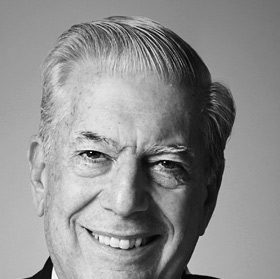Nobel Series – The Dream of the Celt
The interview with Peru’s Nobel Laureate begins with the broadest of statements: “Literature is without borders,” Vargas Llosa says.
Vargas Llosa is a towering figure in world literature today, and along with Salman Rushdie, perhaps the most impressive draw of this year’s Hay Festival. He is also a symbol of Hay Festival’s continuous connection to Latin American literature, which began with Peter Florence’s desire to invite Gabriel Garcia Marquez many years ago. Marquez, famously, is a bitter rival of Vargas Llosa, and with all of the names that flurry through this fascinating conversation, it is that other megalith of South American letters who is conspicuous by the absence of his mention. Literature may be without borders but, it seems, there is the odd locked gate.
Vargas Llosa gives a very distinguished performance here, a man of sixty-five with good looks quite particular to the ageing, moneyed Latino. Peter Florence, a consummate interviewer, was often finding it difficult to find a way in to the novelist’s reflective speeches. Vargas Llosa invites the audience into his past like the master story-teller he is. ‘I began reading French writers in the 1950s,’ he says, starting at his beginning. ‘In Lima we spoke of nothing but the discourse between the novels of Sartre and Camus. Of course, there were the Americans – they were a great influence on me – F. Scott Fitzgerald, Hemingway, William Faulkner – but back then it was mainly the French.’ To the laughter of the audience he reveals it was not until he went to live in Paris that he began to discover the riches of South American Literature.
Vargas Llosa’s new novel, at first glance, seems an odd story for a man who has written so successfully about the crags and creases of his native country. The subject of The Dream of the Celt is Anglo-Irish diplomat and folk-hero Roger Casement, hanged in Pentonville Prison in August 1916 for his involvement in the Easter Rising. Due to my interest in WB Yeats, this much of Casement I knew. But on further explanation the allure of Casement for Vargas Llosa becomes obvious. The Peruvian came to the controversial figure through his admiration for Josef Conrad, who, it seems, was met by Casement at the docks in Southampton on his arrival in England and went on to be the most significant influence on the creation of Heart of Darkness (“Conrad’s masterpiece”). Casement was the major player in moving the British government to condemn the Belgian atrocities in the Congo. And some years later he did a similar thing for the oppressed people working the mines along the Amazonian basin in Brazil and Peru. Casement, moved to fight for the underdog, eventually returned to Ireland where he vociferously supported the armed rebellion of the Irish Nationalists against the British authorities for whom he had worked so tirelessly for decades. He was executed for treason. Vargas Llosa may have responded to Casement’s passion, to his idiosyncrasies, his complexities, but overall, he said, “What I discovered was not a man but a character waiting for his novel.”
Florence asks if, considering how Casement is remembered – as a traitor, a revolutionary – Vargas Llosa was somehow trying to put the record straight, correct an injustice. Casement did so much good for people, after all. ‘Not really,’ says Vargas Llosa. ‘He was a very controversial figure and I am just trying to present this character in a story.’ But he did admit to being disappointed at the level of obscurity afforded the man. Betraying his affection for his subject, Vargas Llosa bemoans the time he was having dinner with faculty members of the University of Kinshasa (which, it is conceivable, would not even exist without the actions of Roger Casement) and they had never heard of him.
An audience member asks the novelist, who once ran for president in Peru as a conservative neoliberal, if Roger Casement would see any parallels if he were around today between the behaviour of the rubber companies in Brazil and Peru in the first decade of the twentieth century and the exploitation of the workers by the mining companies in the Amazon basin today. ‘It is completely different,’ answers Vargas Llosa. ‘The atrocities of then do not compare to the behaviours of the mining companies now.’ His explanation of the nuances of oppression through the ages in his home country is highly unconvincing, and sounds a great deal like it teeters on the edge of a staggering hypocrisy on Vargas Llosa’s part. But perhaps that is a landscape where literature meets politics in one man and an impasse is created. A complexity worthy of one of Vargas Llosa’s own character, perhaps. It was just a shame Garcia Marquez could not have been there to answer the same question.
Banner illustration by Dean Lewis



 Enjoyed this article? Support our writers directly by buying them a coffee and clicking this link.
Enjoyed this article? Support our writers directly by buying them a coffee and clicking this link.







